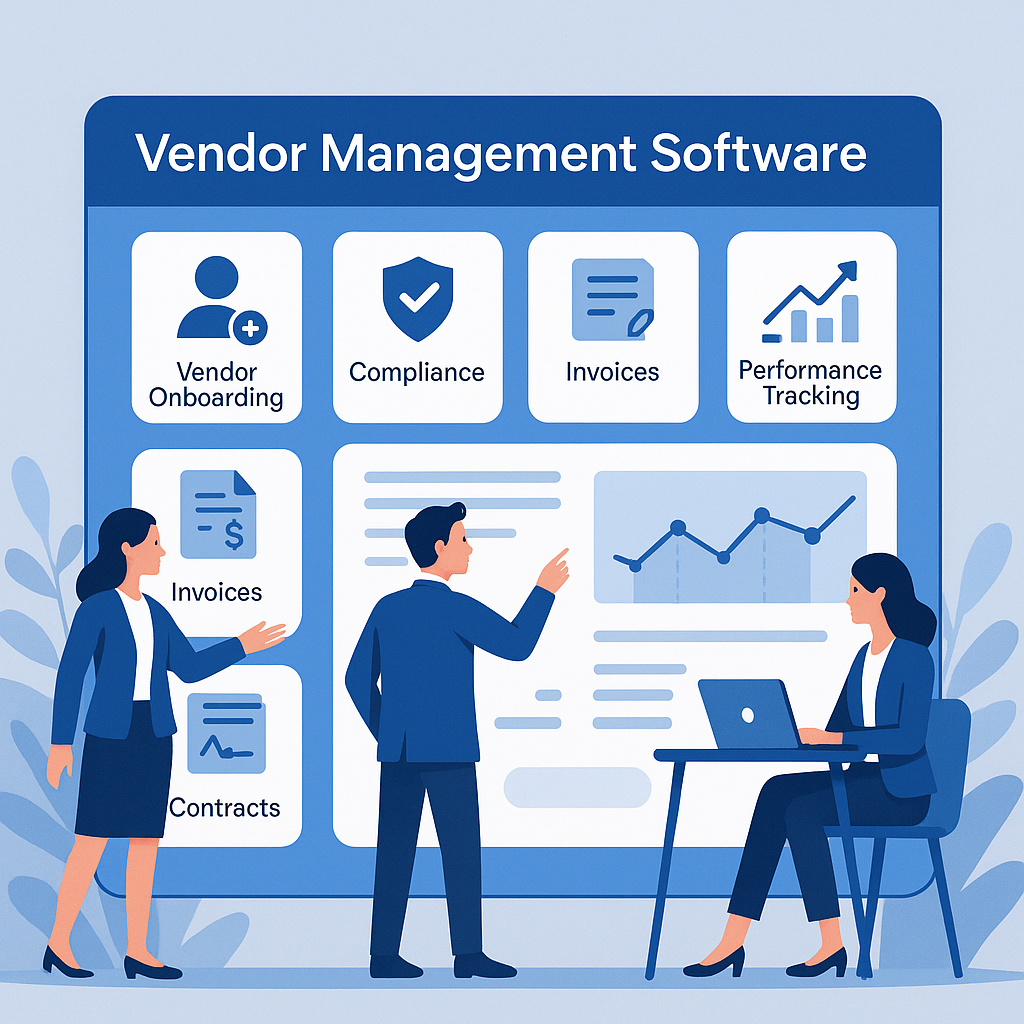.png)
Managing vendors today is not as simple as sending emails or tracking spreadsheets. As companies grow, so do their lists of vendors :suppliers, contractors, agencies, consultants, logistics partners, and manufacturers, among others. This very thing, without the right system, becomes chaotic, slow, and full of mistakes. That is exactly why businesses now are shifting to vendor management software as a must-have tool for operational efficiency.
This is a customer-driven, simple guide to help corporations make informed decisions about whether the implementation of vendor management software is right for them. Whether you are a scaling startup or an enterprise needing automation, this article will help you understand everything from benefits to features to real-life applications.
Vendor management software is a kind of digital platform which enables any business to centralize, organize, and automate everything related to their vendors.
It handles onboarding, compliance checks, performance tracking, document management, payment cycles, communication, and risk management-all within one dashboard.
It helps companies like fast-growing teams across regions improve internal workflows as well as relationships with external vendors.
In other words:
It replaces 100s of emails, shared folders, WhatsApp messages, PDFs, and spreadsheets with one smart system.
Following are some of the real problems usually faced by a business:
Without automation, it becomes hard to keep track of who is doing what, who got paid, who delivered late, and who still hasn't submitted the documents.
Finance teams, procurement teams, and project managers end up spending hours on tasks that should take minutes.
Missing compliance documents may lead to legal implications ,whereas delayed approvals may hold up an entire operation.
Without proper analytics, companies continue using poorly per forming vendors simply because there's no data to compare against.
Messages happen over emails, chats, calls—nothing is centralized.
VMS instantly solves all these problems, and therefore SaaS adoption is growing so rapidly.

Vendor management software normally works in five steps:
Vendors have uploaded documents, company proofs, contracts, certifications, and bank details.
Admins approve them inside the software.
All the documents are stored in one location. Added features include version control and expiry reminders.
It automatically tracks purchase orders, delivery dates, work progress, and current status.
Late deliveries, quality issues, response times, and service scores.
Vendors upload invoices → system processes → finance clears payments.
No more missing or duplicated invoices.
This automated system helps businesses maintain professionalism in vendor relationships, especially for service-based Companies like Beyond Chennai, beyond digital marketing agency.

Onboarding is mentioned to be 5 times faster now, compared to the days taken earlier with the old manual process.
Documents are all digitized. Teams no longer dig through PDFs or old email threads.
Businesses get clarification on:
delivery times
quality issues
pricing
compliance
service levels
This helps them choose the best vendors and remove those causing delays.
The same real-time dashboard is given to procurement ,finance, operations, and leadership.
Expiry notifications, compliance validation, contract reminders-all automated.
Invoices are automatically recorded and tracked. Vendors get paid on time. Finance teams avoid confusion over payments.
Companies save:
time
manpower
Operational cost
error-based losses
This is why many fast-growing teams work closely with companies like Beyond Digital Agency and Beyond to digitalize their vendor systems.
Features customers look for while selecting the right platform include the following:
Store all vendor details in one place.
Makes it a quick and error-free process.
Ensures that laws, regulations, and internal policies are met.
Vendors can log in to upload documents, invoices, and updates.
Monitors contract renewals, expiries, approvals.
Reduces delays and miscommunication.
Helps companies find the best performing vendors.
Chats, notifications, email integrations, task alerts.
This makes the software suitable for SaaS and enterprise teams.
Vendor management software today is used in:
Manufacturing
Construction
Logistics
Retail & E-commerce
Healthcare
Hospitality
IT & SaaS companies
Agencies like Beyond Digital Marketing Agency
Professional service firms
Real estate & interior design companies
Any company working with more than five vendors will find it beneficial to automate.
A construction team reduced vendor delays by 32% using automated reminders.
Healthcare companies ensured that all vendor certifications were valid and automatically monitored.
A retail company processed invoices 60% faster using automated tracking.
Teams like Beyond Chennai and Beyond digital agency brought improvement in coordination with vendors for creative, production, printing ,and tech vendors.
It reduces operational load and enhances the customer experience for SaaS businesses by using vendor management software.
It:
Enhances internal processes.
Improves service delivery.
reduces downtime
allows scaling up more quickly
Creates professionalism that customers can trust.
This is the reason why SaaS teams prefer automated vendor workflows instead of outdated manual methods.
Business environments are changing, and customers expect:
faster delivery better coordination transparent communication You can't scale without having a centralized system in place if your software, service, or product is dependent on several external vendors. ,are leveraging automation to stay ahead of the curve. The digital wave is growing, and early adopters shall dominate.
Streamline Your Business with Vendor Management Software Vendor management software isn't nice to have; it's a must-have if there are businesses that want to scale with speed and accuracy. It simplifies everything from onboarding to payments to performance tracking and gives companies full control over their vendor ecosystem. If your company works with several vendors, automating such workflows will enable you to provide better results for your customers, reduce operational challenges, and scale up faster than ever Book a Demo.
.png)
Got a question? We’ve got answers. If you have any other questions, please contact us via our support center.
Vendor management software is a centralized system that helps businesses onboard vendors, track performance, manage documents, monitor compliance, and streamline payments — all in one dashboard. It replaces manual spreadsheets and emails with automated workflows.
As businesses scale, managing multiple vendors becomes complex. Vendor management software helps reduce errors, maintain compliance, improve coordination, and ensure timely deliveries and payments.
As businesses scale, managing multiple vendors becomes complex. Vendor management software helps reduce errors, maintain compliance, improve coordination, and ensure timely deliveries and payments.